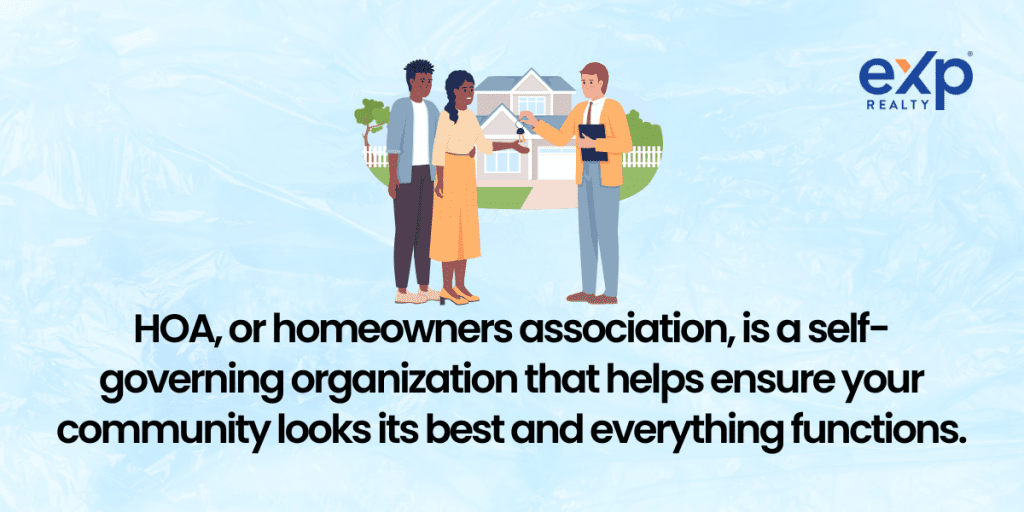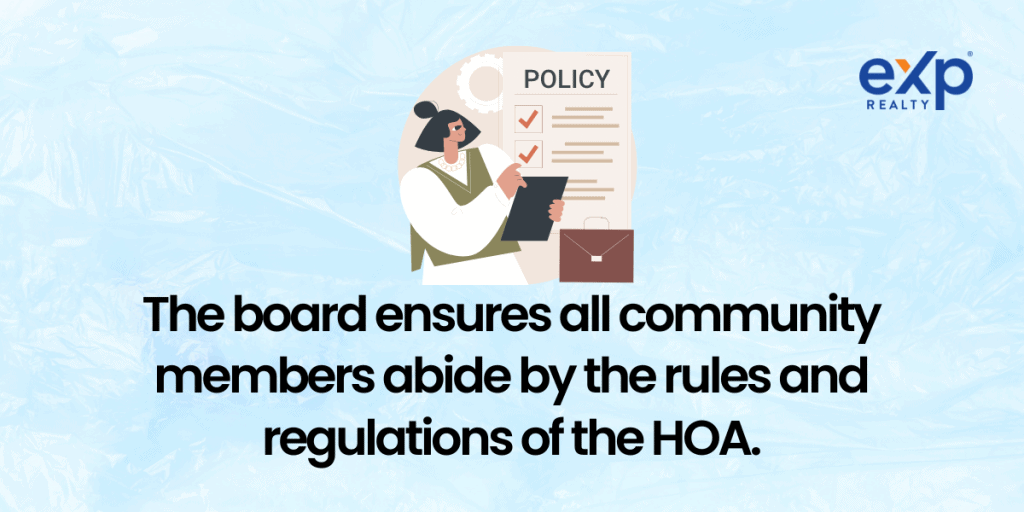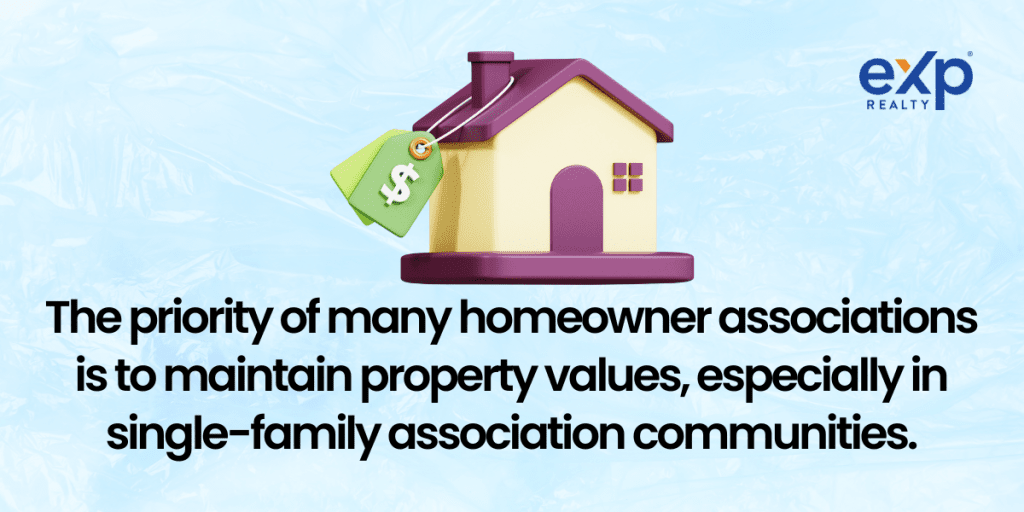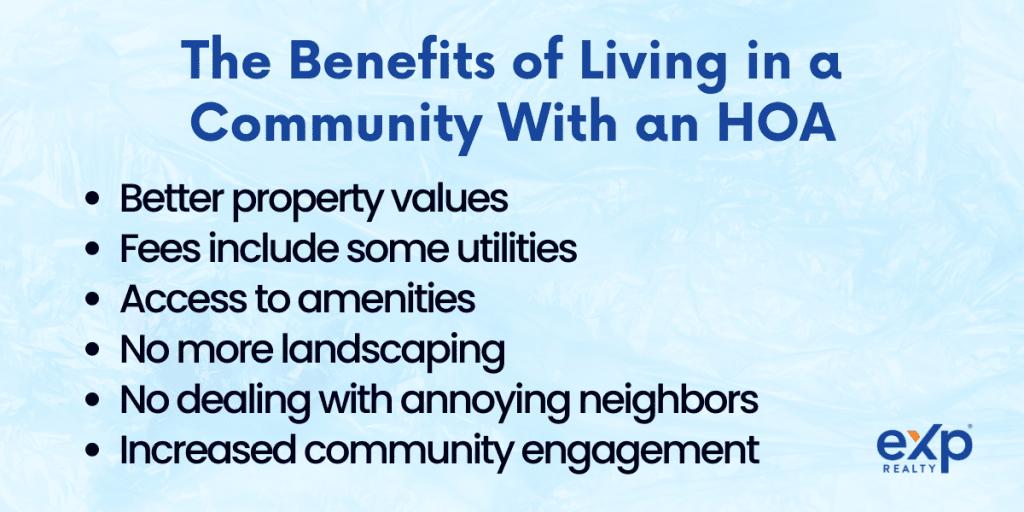Purchasing a home can be overwhelming when you consider all the details that come into play. The first consideration is how much you can afford. This factor determines the home size, style, number of rooms, amenities, and location.
Another critical aspect is whether the property requires you to join a homeowners’ association (HOA). For that reason, understanding the HOA meaning, the members, the rules, and the benefits is crucial. The information will help you decide whether an HOA-run community is the right choice for you.
What is a Homeowners Association (HOA)?

Do you know that over 74 million Americans now live in HOA communities? That means a little above 29% of U.S. homes are in community associations.
An HOA helps ensure your community looks its best and everything functions. The odds are high if buying a free-standing home, townhouse, or condo with shared amenities and common areas. These areas include security gates, parking lots, and swimming pools.
The number of Americans living in properties with HOAs has been booming since the 1970s. So, is it a good option?
HOA Meaning
An HOA, or homeowners association, is a self-governing organization within communities with a common interest. Homeowners in these areas pay set fees for the maintenance of the neighborhood and their units. Unpaid volunteer resident homeowners elected to a board of directors oversee the management of HOAs.
However, the association regulates some aspects of home ownership, but the fees that go into improving the neighborhood might be worth the admission cost. However, it might be in your interest to avoid HOA-run communities if you prefer having the final say in what you can do to your property.
Brief Overview of an HOA’s Role in Managing Communities
Homeowners associations will:
- Manage shared or common property in the community
- Protect the values of properties in the community
- Provide services to residents
- Help develop a sense of community through amenities and social activities
Why Do HOAs Exist?
Federal, state, and local laws help in the formation of HOAs. Governing documents and Covenants, Conditions, and Restrictions (CC&R) the roles and responsibilities of the associations and board members.
An HOA exists to:
- Oversee amenities and common area maintenance
- Collect dues
- Pay ongoing expenses
- Provide shared services
- Enforce governing documents
- Save for capital expenditures and components
What Does the HOA Board of Directors Do?

The HOA board consists of different people responsible for running the association. Other residents of the community elect the members of the board. A typical board of directors is an entity that operates within the confines of your community.
The number of board members ranges between three and seven. The bylaws determine the number.
These positions are similar to those in corporate business and run according to Roberts’ Rules of Order. The rules, motions, and laws govern meetings and communication with other HOA members on what is voted on and passed.
Here is a rundown of the four core members and their responsibilities.
President
The president is the HOA board leader. They also represent your community. Presidents work closely with board members, vendors, homeowners, and HOA managers, among others.
The responsibilities of a president on the board include:
- Presiding board meetings
- Facilitating the decision-making process
- Serving as the HOA spokesperson
- Signing checks, contracts, and other legal documents
Vice President
The vice is in charge in the absence of the president. A vice president works closely with the president and takes over if the latter cannot focus on their regular duties, is sick, on vacation, or is away.
However, some associations give the vice president further duties. The vice president must have the same knowledge of the regulations, bylaws, and workings as the president.
Additional responsibilities of the vice president may include:
- Serve as the head of an architectural review committee, maintenance committee, and others in your HOA
- Liaise with other members
The role of a vice president might be redundant in smaller communities. However, large boards appreciate having the position.
Secretary
The secretary is an integral position in the HOA leadership structure.
The HOA secretary roles include:
- Creating a board meeting agenda with the president
- Recording board meeting minutes
- Ensure quorum during the meetings
- Sending out notices for meetings
- Ensure compliance with governing documents
- Maintaining bank information and other critical documents
- Storing records of homeowners and maintenance
Treasurer
An HOA treasurer oversees the financial operations of the association. Their responsibilities include:
- Developing the budget
- Monitoring income and expenses
- Issuing payments to vendors
- Collecting assessments
- Financial reports preparation
- Carrying out regular audits
- Serving as the head of the finance committee
Other HOA Board Duties
An association must maintain structure, order, and peace to enjoy the perks of living in an HOA community. Here is a list of more HOA board responsibilities to understand the value they provide.
Ensure Compliance With Laws and Governing Documents
HOA board members guarantee their association complies with local, state, and federal laws. The board also ensures the community members follow its governing documents.
Common Area Maintenance
The board members maintain common areas, including basketball courts, clubhouses, gyms, and swimming pools. Structural components of shared buildings, such as exterior walls, the roof, and interior fixtures, also fall under the mundane of the board. They must facilitate maintenance work, so all common areas are functional and safe.
Enforce Rules and Regulations

The board ensures all community members abide by the rules and regulations of the HOA, meaning the board must follow the governing document provisions when dealing with individuals who break the bylaws.
Conflict Resolution
Fights, disagreements, or misunderstandings are unavoidable in a community. They can occur between board members, homeowners, and both.
HOA board members engage in conflict resolution to maintain peace and order. They mediate and resolve conflicts to avoid involving law enforcement and legal cases—where possible.
HOA Finance Management
The most successful HOA community is a financially stable one. Board members manage the finances of the association. Some critical financial-related tasks include the preparation of an annual budget and other reports.
Legal Duties of HOA Board Members
HOA board fiduciary duties come from state corporate law. Most associations are not-for-profit corporations after filing articles of incorporation in their home state.
The board members serve in a position of trust, and each state imposes a fiduciary duty on the board of directors, so they must act in the best interest of the HOA. These duties apply to HOAs even if they are non-profit corporations and board members are volunteers.
Here are the basic legal duties of the board of directors.
Duty of Care
Board members must make informed decisions, which requires research before they act or vote on a matter. For instance, the members must be familiar with the HOA CC&Rs and situation details before fining a homeowner for violating a rule.
Board members must also be reasonable, use sound business judgment, and avoid arbitrary actions. For instance, they cannot issue a fine against a homeowner for using a color they don’t like because it does not violate the association rules.
Duty of Loyalty
The board of directors must act fairly for the benefit and interest of the HOA, meaning members should also not make decisions based on personal gain or interest. Further, the board must avoid acting in areas where there is a conflict of interest.
The board must protect member confidentiality and avoid divulging information they learn in confidence. For instance, you might confide in a board member about an impending home foreclosure to organize a payment plan for your HOA dues. The member should not divulge the information to a neighbor or friend.
Duty to Act
The HOA board must perform its duties but cannot act or make decisions without authority. HOA authority comes from state law obligations and governing documents.
What are Homeowners Association Rules?
Breaking HOA rules can result in a notice or a fine. How each association deals with violations depends on the CC&Rs and how the board enforces rules. Some start with a warning letter, and others might jump right to fining you.
Remember, the HOA rules are legally binding, and you agree to abide by them when signing a membership form. The local police have no authority to enforce specific bylaws. However, a civil court can bring in infringements where violations may result in a monetary penalty or can request police intervention.
Ask yourself whether you are comfortable with the HOA rules and restrictions and whether you are ready for these additional home costs. Research the regulations in advance before committing to purchase. Specifics vary for each HOA, but these are the most common rules.
Pay Your Annual Assessment
All associations have a yearly assessment. The board breaks down the fees for each unit. Collection of the dues depends on the regulations—they can be annually, semi-annually, quarterly, or monthly.
The fees fund various common elements in the community, including insurance, improvements, and maintenance. Some amount is for maintaining common areas. A significant proportion goes into paying for cable services, water, or security.
Many homeowners associations hire a property management company or a third-party firm to manage these details. The fees go up over time. Request financial reports going back five years before buying a home in an HOA community. Doing this will help you see whether the HOA has enough funds in reserves or savings to cover enormous future improvements.
Keep Up the Appearance of Your Property

The priority of many homeowner associations is to maintain property values, especially in single-family association communities. Some may require you to paint your home when fading is beyond an acceptable level.
Further, there might be rules regarding colors, style, and height of fences. You should request approval from the board if you want to go outside these guidelines. They may deny such requests to preserve the uniform aesthetics of a community.
Rentals
Many HOA communities don’t allow residents to rent out their properties. Verify the rules concerning rentals to avoid legal issues and expensive fines. The insurance contracts these associations carry depend on the ratio of rentals to non-rentals, so they take renting seriously.
Many associations have set rules about renting. Such HOAs only allow renting out a specific percentage of units at a given time. Further, the HOA may prohibit listing your house on any home-sharing, vacation, or short-term rental websites, such as Airbnb.
Landscaping
The HOA ensures the community looks a certain way and has rules regarding green spaces. Some include keeping the lawn short and maintaining the home’s exterior. Other rules are specific to the area, such as the plants you can grow.
Vehicles
Homeowners associations usually have regulations relating to vehicles. The rules include the number of cars you can put on your property and where you can park. Confirm the number of deeded parking spaces that come with your home.
The associations also have speed limit rules. Associations can stipulate the types of vehicles you can have on a property. Some limitations include commercial vehicles, boats, RVs, and more.
Pets
HOAs may also have rules concerning pets, including whether you should use a leash, the number of pets on your property, and the kind you can keep. Other restrictions include where you can walk your pet.
Pet regulations allow HOAs more control over their communities. After all, your pets will share some amenities, and the associations want to exercise control over them.
Trash
Most HOAs have rules about waste. These rules include limiting what you can dispose of in the community dumpsters, such as boxes and trash you have not broken down. There will be rules on when you can take out your trash cans to the curb and when to bring them back in.
Displaying Holiday Decorations and Flags
HOAs have strict rules that elaborate on what holiday decorations are and their size. The regulations may mention when to put up the decorations and take them down. These limitations might not be in your favor if you prefer having lights up long after the holiday season.
HOAs that prohibit displaying the American flag are contravening the Act of 2005, which makes it illegal for associations to restrict homeowners from putting the U.S. flag. However, the HOA can specify the manner, place, and time you display your flag. For example, some HOAs prohibit putting up a banner on a rickety pole or if it’s blocking the neighbor’s view.
Noise
Most HOAs have rule noises, including when it is allowed. The associations will even quote quiet hours, restricting noise in the community early in the morning or at night.
An HOA board may fine you for excessive noise complaints or limit the number of people you invite to a backyard party.
Exterior Storage
Many HOAs have rules about what you can store outside your house. There are also rules for the types of exterior storage structures you use. For instance, some associations will ask you to stow things like kayaks and bikes out of sight.
The Benefits of Living in a Community With an HOA

What do you, as a homeowner or tenant, get in return for adhering to the HOA rules and regulations? The best-run associations for you and your family come with many benefits.
Better Property Values
Living in an HOA community means someone has invested a lot of money into a property and wants to ensure it retains and increases its value. You have control over your home but not the rest of the neighborhood. This is where an HOA can help.
The association has control over the aesthetic curb appeal and consistency of the neighborhood. The section above outlines the rules HOAs have over several elements in a community. These rules help make your community look nice to keep property values high.
Fees Include Some Utilities
An HOA community means you deal with fewer headaches when managing your utility bills. Many associations include utilities as part of the monthly dues, including trash, gas, recycling, and water. The process makes it less time-consuming for homeowners.
However, check with your HOA because not all will include utilities in the monthly fees.
Access to Amenities
Homeowners associations don’t have the same amenities, but many offer a wide range for their residents. Some of these include community pools, recreational parks, and playgrounds.
Such amenities within reach help you save effort and time driving to a public park or pool. HOA amenities are less crowded, safer, and better maintained than their public counterparts.
No More Landscaping
Landscaping can take hours, but you don’t have to spend time on the task when living in an HOA community. The fees you pay already include landscaping.
The board of directors will find and contract a professional landscaper for all your landscaping requirements—in line with the regulations. Your HOA ensures all trails are clear of litter and debris. The landscapers also plant flowers and trim vegetation for a lively and bright neighborhood.
No Dealing With Annoying Neighbors
Inconsiderate neighbors come with a long list of annoying habits, including smelly trash, loud parties, and barking dogs. However, you don’t have to confront a next-door neighbor.
The HOA offers amicable dispute resolution when you have an issue with a neighbor. Your association enforces all the regulations and rules with any offenders.
Increased Community Engagement
Streets in an HOA neighborhood offer a greater sense of community than an ordinary one. Sharing an HOA helps foster a sense of community. Further, neighbors get to know each other through regular meetings.
Many associations offer their residents more opportunities for social events. For example, an HOA can host block parties and social gatherings using money they pool for the fees. Neighbors also meet when sharing amenities such as gyms.
The Potential Drawbacks of Living in a Community With an HOA
HOA life has many advantages, but some things are disadvantageous. Here are the cons of living in an HOA community.
Fees Can be High
Maintaining an HOA community is an expensive process. High fees typically mean more general maintenance, amenities, and landscaping.
If the community comes with high HOA fees, ask the management to provide a list of everything it includes. Plus, thoroughly inspect your monthly budget and ensure you can afford the dues. Failure to pay can lead to expensive repercussions.
Restrictions on Home Customization Options
Design restrictions are great, but you must find the right fit for the home you want. For example, an HOA might be a planned community with a specific and traditional home style.
Such associations are restrictive with the materials and defined roof pitches. The community is right up your alley if you prefer the traditional home. However, an HOA will probably turn down your request to install a modern flat roof.
Ongoing design restrictions for some homeowners associations can be a disadvantage. For instance, many communities have restrictions on adding a shed, the design, the color, or how far it is from your home.
Further, some associations will have an approved builder list you must follow. This is especially true if reconsidering some allowed customization.
Violations and Fines
A homeowner may receive a fine for violating the rules and standards of the community. A friendly written or verbal reminder is all it takes to resolve most violations. Many HOAs attempt to be neighborly and work with owners, especially those going through difficult circumstances.
While HOA fine enforcement mostly starts and ends with a warning, the association will have an escalation protocol for fines. The fines start at about $25 and increase up to $200 if you continue violating the rule or don’t pay. The violation type also determines how much the fine is.
The most common HOA rule violations include the following:
- Leaving your landscaping unattended
- Parking vehicles where they shouldn’t be
- Renting out a fully refurbished basement or a bedroom
- Discarding furniture and other enormous waste in the front or backyard
- Not adhering to the deadline for removing holiday decorations
You Pay For All Amenities—Even Those You Don’t Use
You must pay the monthly dues and annual assessments, regardless of whether you use the amenities. You can receive a fine if you don’t pay for them.
Risk of Lien or Foreclosure
HOA living has the additional threat of liens and foreclosures, especially if you repeatedly default the fines or regular fees. However, this depends on the state. Even if your state does not allow foreclosures under such circumstances, the amount increases until you pay.
A lien or foreclosure is usually the last resort. However, refusing to pay the fees, as contractually agreed, means you’re cheating yourself, your neighbors, and the community. The HOA has to come up with ways to make up for the difference, so they place a lien on your home with the ability to foreclose.
Poor Management
Volunteers from the community make up the HOA panel. A good board will be professional and efficient. A bad one can mismanage the association, a community, abuse their power, or misspend money.
Problems with HOA management include major and minor inconveniences. Some signs of poor association management are:
- A high turnover rate for HOA managers
- Lack of communication
- Provision of low-quality vendor services
- Lack of bookkeeping
- Inability to resolve homeowner and maintenance issues
- Lack of professionalism when handling irate homeowners
- Regular non-compliance with federal, state, and local laws leads to expensive to costly fines
Tips for Homeowners in HOA Communities
Homeowners associations offer you various benefits. However, if you’ve never been a member of any HOA community, you might not know what to expect. Here is a short guide on how to get the most out of any HOA.
Have a Point of Contact
Be acquainted with the community board of directors to establish a point of contact if you have questions. Some boards hire a professional property management company—get the phone number. Your neighbor might be the board president, so get their email address.
Read the Governing Documents
Study the governing documents and become familiar with the community rules and regulations — it only takes 30 to 120 minutes. Always ask for help if anything is unclear. The HOA board or Community Association Manager (CAM) will help answer questions.
Ask about any resources an HOA offers to new homeowners. Some include a website, a newsletter, and others. Reading these resources will help you avoid expensive mistakes and tension with other members.
Check Out the Surroundings
Be familiar with the resources the HOA offers. A community may have a common area pool, maintain a walking path, or adjoin a city-maintained park. Familiarity with the surroundings means you’ll be more comfortable moving into your new home.
Pick up access cards or keys to amenities in the community, even if you don’t intend to use them. A group of friends and family may come to town, and you require a place for their kids to play. Plus, you are paying for it.
Find Out About the Fees
Each community has different ways it structures its fees. Make sure you ask the HOA representative these questions:
- How does the HOA set the fees?
- How often do increases occur, and by how much?
- Is there a printed HOA dues history per year for the last 10 years?
- How large is the HOA reserve fund?
Remember to ask for a record of any special assessments made in the past and for the near future. Economies of scale dictate that special assessments are likely higher for small HOAs.
Find Out What the Monthly Dues Cover
Check if homeowners pay extra for services such as garbage pickup and cable. Compare the rates with other associations with other communities in the area.
Remember, you’ll pay for any recreational facilities the association offers. Find out the hours for using these amenities. The HOA might also have rules for the number of guests using the facilities.
Pay Fees on Time
Falling behind on your fees has major repercussions, as explained above. The best way to avoid such situations is to pay what you owe on time.
For a fine, your first option is to pay it and get it done with. You can ask for a variance, which is an exception to the covenant or deed by which the association functions.
Always pay rates, even when they increase at alarming rates. Next, review the bylaws and deeds to see your legal rights and initiate dialog with the HOA board.
Be a Good Neighbor
Following the rules and regulations is the first step to maintaining a good relationship between you and your neighbors. Avoid jumping to conclusions if you suspect a neighbor is breaking the regulations, such as noise levels or parking. Instead, have an informal talk with the offending party before reporting them to the HOA board.
However, always keep open lines of communication between you and your neighbors. Remember to reach out and invite them to any HOA-sponsored activities and meets.
Attend Annual Meetings
Attending the HOA annual meeting is an excellent way to understand what’s happening in the community. Some discussion topics include the latest projects and potential problems residents are facing. The meetings only take a few hours each year.
Attend Community Social Events
Most HOAs host community gatherings or social events for their residents and owners. They present a great way to meet neighbors and get a sense of community with fellow homeowners.
Sign-Up for HOA Community Emails
Email is an excellent communication tool for residents within a community. The channel doesn’t require excessive expenditure on paper or postage. Further, HOAs use emails to inform members of impending maintenance works, voting sessions, and safety updates.
Be Active and Volunteer
HOAs provide many volunteer opportunities if you are looking for more ways to get involved. Your involvement means you can influence community regulations and policies.
You also have the option to run for a position on the HOA board of directors. Doing this gives you the ability to:
- Correct persistent problems
- Protect your property
- Understand the laws better
- Steer the community to meet more resident and homeowner expectations
- Learn life lessons
- Learn leadership skills
- Build your resume
- Have fun in the process
Key Takeaways
Purchasing a home comes with many responsibilities and rights. But owning a property in a specific community means you’re part of a homeowners association. HOAs are beneficial because they take care of critical homeownership tasks such as landscaping, utilities, and maintenance.
However, the associations have strict rules and regulations. Some limit what you can do with your house, put up in your yard, or even park your vehicles. Further, all these services come at a fee—whether you use them or not.
Understanding the HOA’s role in your community helps ensure you choose the right property in a neighborhood that fits your lifestyle. Further, an HOA has a positive effect on your home’s value. This means you can charge more when renting or selling for a better return on investment.
FAQs
Here are some common questions we come across about homeowner associations.
What does HOA mean in real estate?
Homeowners associations (HOAs) are private organizations that oversee the management of some residential communities. The association comprises volunteers from the community and a governing body that sets rules and regulations for the residents to follow.
Why is it called an HOA?
An HOA is an entity that enforces rules for those living in planned subdivision, or condominium communities. Your HOA is also responsible for maintaining the buildings, deciding whether to pursue renovation projects, and managing shared resources.
What are the disadvantages of having an HOA?
Disadvantages of HOA living include:
- Fees for the perks the community offers
- Some HOAs have stringent rules that dictate how the house looks, the paint color, landscaping, decorations you put up, and more
- Homeowners have to agree to the governing rules and regulations
- Making any renovations or improvements requires you to follow a process
What exactly is a homeowners association in the USA?
Some states require HOAs to register with them, and failure means they lose some rights. For example, Michigan and Minnesota require an HOA to register as a non-profit organization. HOAs in Florida have to register as a corporation and a not-for-profit.
Federal laws also have a direct effect on how HOAs function. Some laws regulate what the association can do and protect the public and homeowners. Violating federal statutes has severe consequences. Board members, officers, and homeowners must be familiar with the laws applying to HOAs.
What is an HOA (homeowner association), and how does it work?
The HOA is a group of residents who govern their neighborhood or multi-unit building. This official association creates legally enforceable rules about what you and your neighbors can do with a property and community.
All members of the community pay association fees that go into paying for maintenance and amenities, including parks and landscaping. At the top of the HOA structure is the board of directors.
The board:
- Organizes regular meetings
- Establishes and maintains budgets
- Vets and hires vendors
- Oversees the reserve fund
- Plans social activities and events
- Enforces community rules
Do people like HOAs?
Yes, many people prefer HOAs. The association acts as an arbitrator with difficult neighbors, helps improve property values, and fosters a feeling of community among residents.
Why do HOAs have so much power?
All HOAs expect members to enter contractual agreements that govern what they can and cannot do.
Why do HOAs cost so much?
There’s a trade-off between monthly costs and benefits. Research shows the return on investment and value protection from well-run HOAs is worthy for most property owners.
However, evaluate an HOA’s budget, spending, covenant, and meeting notes to understand how it works and make an informed decision. Get in touch with a local realtor to explain further.
Can you be forced to join an HOA?
Yes, if the property you want is in an HOA community. New buyers must join the association and agree to the covenants.
What do most HOA fees cover?
The amount varies widely and depends on the amenities your community has. Check the HOA governing documents to see what the fees cover.
Some examples are:
- Pool maintenance
- Trash removal
- Fire alarm systems
- Pest control in common areas
- Gate security
- Utilities such as electricity
- Snow removal
- Landscaping and grounds maintenance
Are HOA fees included in the mortgage?
Usually not. You pay the homeowners association fees directly to the HOA, meaning you don’t make these payments to a mortgage servicer.
Can you leave a homeowners association?
Only when you sell your home.
Does local law supersede HOA rules?
This is a question a local eXp real estate agent can answer. Click here to find one.
Where can I find a real estate agent to answer my questions about HOAs near me?
Use https://exprealty.com/agents to search for a local realtor near you.
How can I receive alerts for homes for sale near me?
Perform a search for what you are looking for and sign up for instant, daily, weekly, or monthly emails at https://exprealty.com/properties/.





